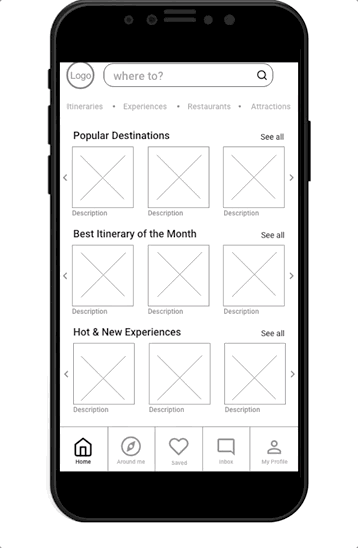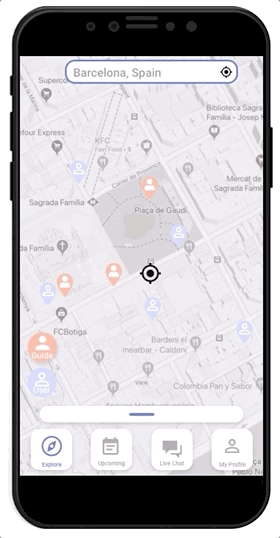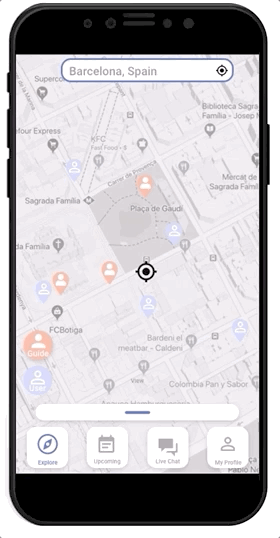
Around
Travel app design project
Role
User research, UX/UI design, Prototyping,
Usability testing
Tools
Miro, Invision, Adobe XD
Timeline
3 weeks
Problem
Global tourism hit a record high in 2018 and it is only increasing. With the booming travel industry, every travel destination is losing its uniqueness due to generic“must-see” experiences and tour packages.
People want to find a unique experience that sets them apart from others, without having to search the web for hours. How might we help travelers quickly find authentic experiences to make their next trip more special and personal?
Solution
A travel app for modern travelers who are looking to find a unique and authentic experience by connecting with real people.
Targeting the users
I first began my research by searching which age group travels the most.

More than 70% of them were looking for off the beaten path experiences and recommendations from locals.
They are also the highest spenders, spending around about $3,500 per trip and $60 a day.
People between the ages of 23-38 travels the most
with an average of 35 vacation days a year.
Competitor Analysis
I wanted to take a look at how other popular travel apps solved the user pain points I identified and the competitor analysis revealed that none of the apps were solving all 4 pain points.

User Interview
I conducted 5 user interviews who are in between the ages of 20s-40s to better understand how they generally plan for their trips, what they do to make their experience unique and memorable, and what are the major frustrations they face while planning.

From the common pain points gathered from the interview, I was able to pinpoint one common underlying issue to all these pain points. Users wanted to talk directly with the locals and other travelers to get real, unique, and reliable information instead of endlessly searching online.

User Insight
Travelers struggle to find unique and authentic local experiences because there is too many generic tourist information online and it is difficult to filter out the real experiences. They want to get accurate information quickly by talking to real people and find hidden-gems that they would only get by through word of mouth.
Therefore, I believe that people need a reliable source to find authentic experiences from the sea of generic tourist activities and that I might be able to help by creating an app that lets the users connect to the locals and other travelers to get real and reliable information for their trip.
How might we optimize the searching experience and provide a safe connection for the users so that they can easily and safely reach out to people to discover unique and authentic experiences?
User Persona
Meet Chris! Chris is a college student and he and his friends are planning a trip to Barcelona for winter break. He wants to make his trip special however he is having a difficult time finding activities that are non-touristy and unique because there are too many generic tourist activities.

Brainstorming
Based on the user persona, I started brainstorming using “I like, I wish, What if” method to quickly come up with ideas for features that can help Chris.


Key feature
Users can connect to all the local guides and other users around them by using the live map that shows their current location.
Through this feature, the users can freely message any local guides and other users that are traveling in the same location to ask questions, book or plan activities, and share local information.
First prototype



Step 1.
Open “Around me” tab to open the map
Step 2.
Choose a local guide or other
users nearby to connect.
Step 2A.
Other user’s profile view when clicked. users can send a message.
Step 2B.
Local guide’s profile view when clicked.
Users can send a message or
book an experience.
Step 3.
Send a message
Users weren’t sure what was the main purpose of the app, Is it a planning app or an app to use while traveling?
Usability Testing Insight
Users did not feel safe about reaching out to strangers and revealing their location on the map.

Second Iteration
Since the users were concerned about their safety, I removed the feature to connect to other users and added a community section where people can post questions or local tips.
Added section for searching restaurants and other attractions nearby and add to their itinerary to make it feel more like a travel planning app.
Uhm...😳🤔 what exactly does my app do again?
After iterating my app based on the usability testing feedback, I couldn’t figure out what made my app special anymore. There were many new features but none of them were solutions to the problems that I defined in the research, which connected the users to real people. My app was trying to do too much and did none of them correctly.
Final Iteration

Privacy
Decided to show the location of the event/activities instead of the location of people for the safety of our users.
Focus
Added the users back on the map, and allowed users to create their own events for a more personalized and unique experience.
Removed all the extra features such as itinerary, restaurant, activities.


Map with users and guides
List view for events posted by the users.
User event detail view. Users can send a message,
join in, or check out the user profile.
List view for events posted by the guides
Guide experience
detail page.
Users can send a message, book, or check out the guide profile.
Final Takeaways
Research is not a linear process
I was just busy moving forward at first and did not look back to previous steps to see if my ideas and progress were all connecting together. With the amount of data you get through the research, It is easy to get lost and get carried away by small details. In order to stay focused, it is crucial to constantly go back to research goals and main problems and Iterate again and again.
Do not try to solve every problem
During iteration, people couldn’t figure out the purpose of my app and what they have to use it for. I realized that not every user feedback is 100% weighted. Everyone has different opinions and experiences so the feedback I get can be different from my expectations. As long as my research can support the decisions I’ve made, I need to know when to push my ideas and filter out minor problems. Ideas without research will soon lose its sense of direction and get absorbed into the sea of gray. Solving one problem effectively is better than trying to solve all and fail.


